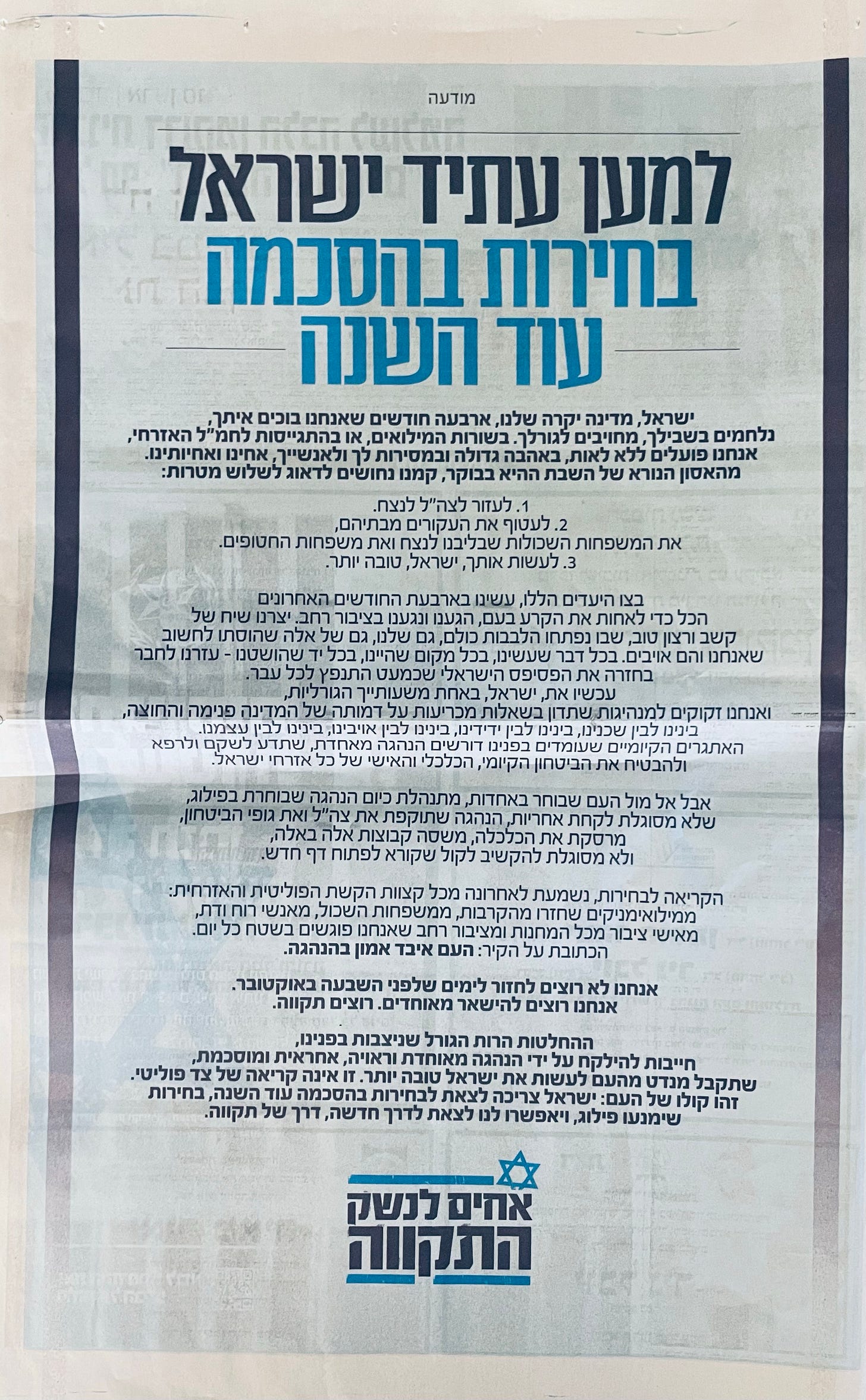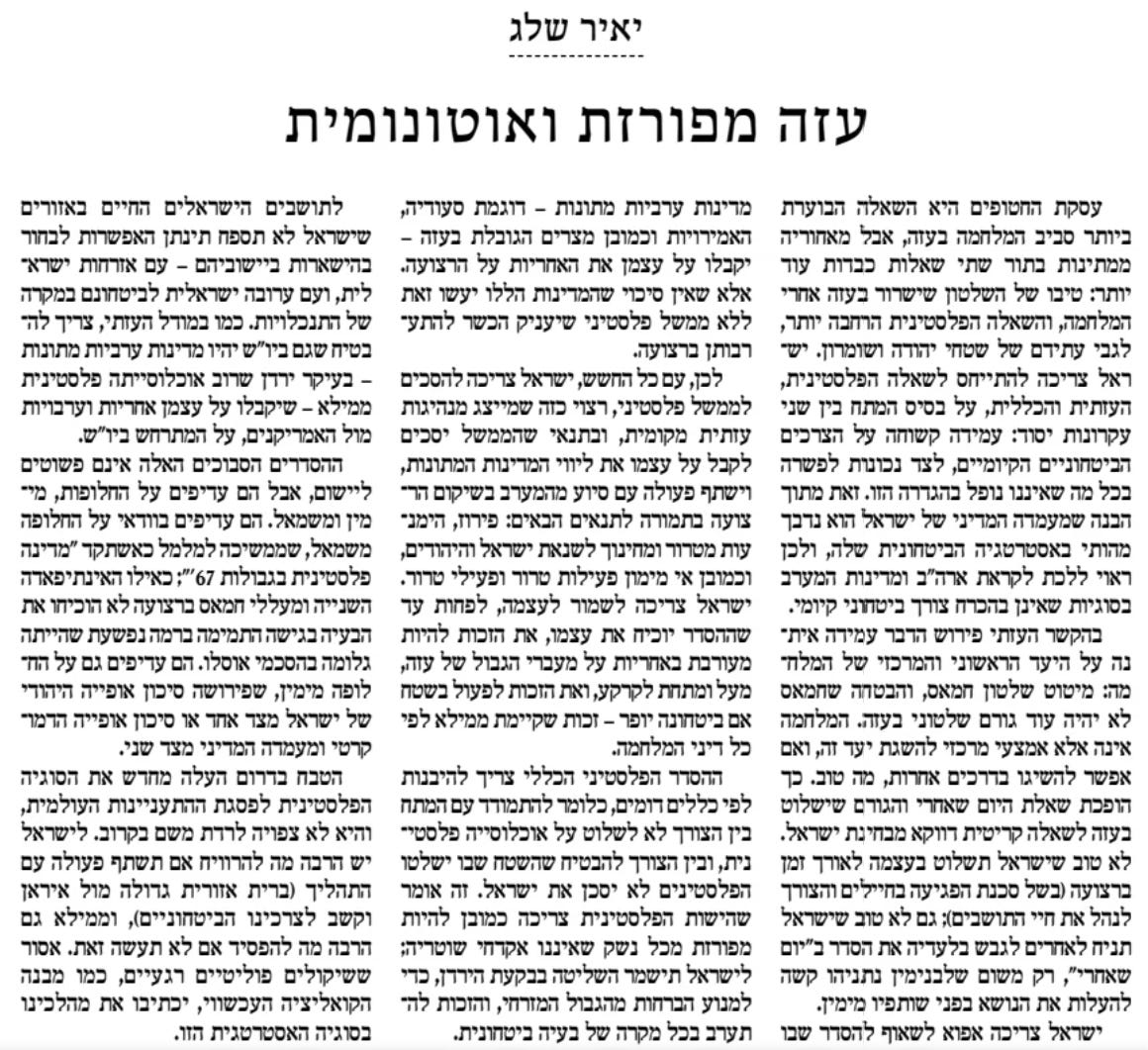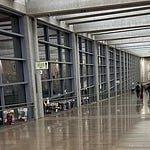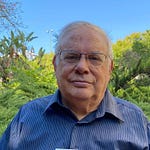These three pieces (including the video above) all represent different points of view about how to address the critical moment in which Israel finds itself. We share them not necessarily out of agreement (and you, also, may or may not agree), but in order to provide a lens onto the debates now simmering in Israel that often don’t get fully reflected in the standard English language press.
First, a look at what’s coming this week (barring, of course, any significant changes in the news, which could require changes on our end, too. …)
SUNDAY (2/11): As the war drags on (which is not to say it’s not going well … it’s only to say that it’s dragging on), Israelis are increasingly beginning to think about “the day after.” Today, we look at three indicators of what’s on Israelis’ minds: (a) the video ad above, (b) a printed ad that appeared in many newspapers calling for elections, and (c) an op ed piece from Makor Rishon, by Yair Sheleg, which offers a nuanced take on what Israel’s Gaza and Palestinian options are.
MONDAY: (2/12): You may recall from the days of Judicial Reform that Likud supporters were calling the pilots who were refusing to train “traitors,” “anarchists” and more. In this video, a Bibi diehard and his former close friend, a pilot, had become estranged over their political disagreements last year. But after Eitan, the Bibi-diehard, was very badly wounded, his pilot-friend came to visit him in the hospital. Their conversation about what Israel needs to become moved me deeply. We’ll run the whole thing for paid subscribers, and a portion for everyone.
TUESDAY (2/13): Ari Harow is former Chief of Staff to Israeli Prime Minister, and more recently, turned state's witness against Netanyahu in Bibi’s corruption trials. To this day, Harow believes that Benjamin Netanyahu is one of the greatest leaders the Jewish people has known. We sat at my home for a lengthy conversation, about the Obama years, why Bibi (who said we should never negotiate with terrorists) went ahead with the terrible Shalit deal, Iran and (in the second portion), what Harow thinks Bibi should do and will do at this critical juncture in Israeli history. Tuesday we will air Part I of our conversation, with an excerpt for everyone and the full recording plus a transcript for our paid subscribers. The second half will follow next week.
WEDNESDAY (2/14): Einat Wilf is one of the smartest, most articulate thinkers about Israel, Zionism and the conflict with the Palestinians I know. When she tweeted the following, I immediately reached out and asked her to talk about this issue with us. She did, and we’ll post that conversation on Wednesday, again with an excerpt for everyone and the full recording plus a transcript for our paid subscribers.
THURSDAY (2/15): Even though the war is still raging, the army is beginning to investigate what seem to have been major errors. One of those was a tank that fired on a home in Kibbutz Bee’ri on October 7th, even though those involved knew that there were a dozen Israelis in the home (most were killed by the Israeli tank). We look at the investigation of the senior officer in charge, and share a haunting video with some survivors of Be’eri who recount what went on in those critical moments.
FRIDAY (2/16): We’ll wrap up the week, and also ask “Are we winning?” A fascinating piece in this weekend’s paper, written by someone who has been fighting in Gaza almost the entire time, essentially says “we haven’t won, but we’re going to”—and explains why he believes that, and what it will take to win. We’ll conclude the week with that piece, translated from the Hebrew for our readers.
Last night began to look a lot like the anti-judicial reform protest days. These was a large-ish protest, including a breakaway group that burned fires and blocked the Ayalon, the major highway running through Tel Aviv.
The protests and highway-blocking these days are not about judicial reform, but about a demand from increasing numbers of Israelis that we hold elections. There’s no obvious mechanism for forcing Netanyahu to call elections, barring defections from his 64-person coalition, which at the moment, at least, seems unlikely.
So some people are turning up the heat. The video ad above is meant to stoke people’s passions and rage at what has happened to us; the printed ad below, which was published in many Israeli newspapers, is designed to appeal to Israelis’ love of their country and their knowledge that we’re in a precarious moment.
There are a lot of words in this ad, put out by “Brothers in Arms/HaTikvah,” once the group at the center of the anti-judicial reform protests. It’s more a short “pamphlet” meant to be widely read than an ad. Here’s a translation:
For the sake of Israel’s future
Elections by widespread agreement
This year
Israel, our treasured country, for four months we have been weeping with you, gone to combat for you, committed to your destiny. Whether as reservists or as those manning the civilian command centers, we have been working without respite, with deep love and devotion to you and your people, our brothers and sisters. Even since the horrifying tragedy on that Shabbat morning, we have been determined to pursue three goals:
To help the IDF to win
To assist those who have been uprooted from their homes, the bereaved families who will be in our hearts for eternity, and the families of the hostages
And to make you, Israel, a better place.
Committed to these goals, we have done everything possible over the past four months to heal the tear in our people, we have traveled far and met with people from across the spectra. We created a discourse of listening and good will, in which people all opened their hearts, and ours too—even those who incited others to believe that we and they are enemies. Every thing we have done, every place we have been, with every hand that we extended — we worked to reassemble the Israeli mosaic that came close to exploding in every direction.
Now, you, Israel, are in one of your most consequential moments, and we need a leadership that can address the most critical questions about Israel’s character, inwards and out, between us and our neighbors, between us and our friends, between us and our enemies, between us and ourselves. The existential challenges that now stand before us demand a leadership that can unite, that will know how to repair and heal and safeguard the existential, economic and personal security of every Israeli citizen.
But while the people seeks unity, it has a leadership that seeks division, unable to take responsibility, a leadership that attacks the IDF and other security apparatuses, is destroying the economy, incites groups against each other, and is incapable of hearing the voice that yearns to turn a new page.
The call for elections has of late been heard from all segments of the political and civilian spectrum: from reservists who have returned from battle, bereaved families, religious and thought leaders, public figures from every camp and every segment of the population, and the wider public we meet every day. The writing is on the wall:
The public has lost its faith in our leadership.
We do not wish to return to the days before October 7th. We want to remain united. We want hope.
The fateful decisions that we must make must be made by a leadership that unites and that is worthy, responsible and agreed upon, which will have a mandate from Israelis to create a better Israel. This is not the call of one political side. This is the voice of the people: Israel needs to go to elections by widespread agreement this year, elections that will prevent fracture and which will allow us to embark on a new path, a path of hope.
And finally for today, another take on the “day after.” It’s widely reported that President Biden is put out with PM Netanyahu due to the latter’s refusal to discuss Israel’s plans post-war Gaza. Bibi has good reason not to want to discuss it—his own political fortunes depend on putting off the acrimonious debates that the issue will inevitably raise, and, no less significantly, Israel has no good options. It needs to make the least-bad choice that it can.
With that in mind, we offer this quick translation of a column by Yair Sheleg, a leading Israeli public intellectual, which appeared in this weekend’s Makor Rishon. There are no good or easy options, but Sheleg at least offers us a vision of the kind of thinking in which Israelis need to engage.
YAIR SHELEG: A DISARMED AND AUTONOMOUS GAZA
A hostage deal is currently the most burning question about the Gaza War, but after that one, there lie two other questions of even greater moment: the nature of Gazan government after the war, and the larger Palestinian question, regarding the future of Judea and Samaria [=the West Bank]. Israel needs to address the Palestinian question—the Gazans and Palestinians more generally—on the basis of a tension between two fundamental commitments: steadfastly standing by our existential security needs, alongside a willingness to compromise on matters that do not have bearing on our security. That is because Israel’s diplomatic stature is a critical piece of its security strategy, and therefore, it would be wise to accommodate the United States and Western countries on matters that are not necessarily existential security issues.
When it comes to Gaza, that means standing by what has always been the primary and central goal of this war—toppling Hamas and ensuring that it will never again rule Gaza. The war is simply a means to accomplishing that, and if we can accomplish that goal through other means, all the better. Thus, the questions of “the day after” and who will rule in Gaza are critical for Israel. It would not be good for Israel to rule Gaza for the long haul (because of the danger to soldiers and our need to administer that daily lives of Palestinians); it would also not be good for Israel to leave the question of “the day after” for others to determine, simply because Bibi Netanyahu can’t raise the issue due to his right wing coalition partners.
Israel must therefore seek an arrangement whereby moderate Arab states—Saudi Arabia, the UAE and of course Egypt, which borders Gaza—take responsibility for Gaza. But there is no chance that these countries will do so absent a Palestinian government that could lend legitimacy to these countries’ getting involved in Gaza.
Therefore, despite all the worries, Israel must agree to Palestinian government, ideally representing local Gazan leadership, as long as this leadership agrees to accept a partnership with these moderate countries, and agrees to cooperate with Western assistance in the rebuilding of Gaza in exchange for the following conditions: disarming, rejecting terror and education that teaches hatred of Israel and the Jews, and of course, not subsidizing terror or terrorists. Israel needs to reserve for itself, at least until this arrangement proves itself, the right to be responsible for border crossings into Gaza, above and below ground, and the right to operate in Gaza should Israel’s security be threatened—a right that is guaranteed in any event by all laws of warfare.
The wider Palestinian arrangement needs to be constructed along similar lines, in order words between the need not to rule the Palestinian population, and the need to ensure that the areas that the Palestinians control do not threaten Israel. That means that the Palestinian entity needs to be disarmed of any weapon that is not a policeman’s pistol; Israel needs to keep control of the Jordan Valley in order to prevent smuggling [of weapons] from the east side of the border, and the right to intervene in any security matter.
Israelis living in areas that Israel does not annex will have the right to stay in their settlements with their Israeli citizenship, and with a guarantee of Israeli protection should their security be threatened. As in the Gaza model, we need to ensure that moderate Arab states—in the case of Judea and Samaria, mostly Jordan, which in any event has a majority Palestinian population—take responsibility for and make guarantees to the Americans regarding everything that happens in Judea and Samaria.
These complex arrangements will not be easy to implement, but they are preferable to all the alternatives, whether right or left. They are certainly better than the proposal of the left, which continues to mumble as in years past, “a Palestinian state along the ‘67 borders,” as if the Second Intifada and Hamas’ exploits in Gaza have not proved the problematics this life-threatening naïveté which was the core of the Oslo Agreements. They are also preferable to the proposals from the the right, which entail endangering either Israel’s Jewish character or its democratic character, along with its international standing.
The slaughter in the south has returned the issue of the Palestinians to the center of the world’s interest, and it is not going anywhere any time soon. Israel has much to gain from cooperating with the process (a regional compact against Iran and attention to our security needs), and of course, a great deal to lose if we do not do this. It would be terrible were momentary political considerations, such as the makeup of the current coalition, to dictate our next steps in this critical strategic issue.
Until this weekend, I’d never heard of Keith Pekau, the Mayor of Orland Park, Illinois. Though we usually stick to material that comes from inside Israel (hence, Israel from the Inside), his presentation here is so fine that we thought it worth sharing. There’s a pro-Palestinian “ceasefire now” protest, and then his response. Wow.
You can see the original posting in this tweet. If I had to bet, now that his presentation has gone viral, the world is going to be seeing and hearing a lot more of Keith Pekau. And deservedly so.


















